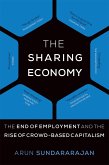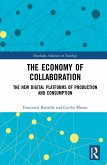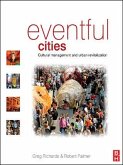This book examines the economy of sharing in a variety of social and political contexts around the world, with consideration given to the role of sharing in relation to social order and social change, political power, group formation, individual networks and concepts of personhood. Widlok advocates a refreshingly broad comparative approach to our understanding of sharing, with a rich range of material from hunter-gatherer ethnography alongside debates and empirical illustrations from globalized society, helping students to avoid Western economic bias in their thinking. Anthropology and the Economy of Sharing also demonstrates that sharing is distinct from gift-giving, exchange and reciprocity, which have become dominant themes in economic anthropology, and suggests that a new focus on sharing will have significant repercussions for anthropological theory. Breaking new ground in this key topic, this volume provides students with a coherent and accessible overview of the economy of sharing from an anthropological perspective.
Hinweis: Dieser Artikel kann nur an eine deutsche Lieferadresse ausgeliefert werden.
Hinweis: Dieser Artikel kann nur an eine deutsche Lieferadresse ausgeliefert werden.
'Anthropologists too often assume all non-market modes of distribution to be forms of gift exchange or reciprocity. Anthropology and the Economy of Sharing shows just what is lost in this sloppy assumption -- particularly, an appreciation of the crucial conceptual and political alternatives that are opened up by social practices of sharing. Clearly argued and convincingly supported with the author's encyclopedic theoretical and ethnographic knowledge of the topic, this is an original book with important implications both for anthropology and for the pressing contemporary social and political issues that it can illuminate.'
James Ferguson, University of Stanford, USA
'In this important and provocative book Thomas Widlok argues that the concept of demand sharing developed in hunter-gatherer studies is an important insight into the human condition. This is a must read for anybody with a serious interest in the complexities of sharing whether in the Kalahari, or in the so-called 'sharing economies' of capitalist societies.'
Nicholas Peterson, School of Archaeology and Anthropology, Australian National University, Australia
'In Anthropology and the Economy of Sharing Thomas Widlok combines a wealth of ethnographic work on sharing practices in hunter-gatherer societies with a critical examination of Airbnb, Uber, and music downloading in the so-called "sharing economy." Unlike gift-giving and market exchange obligations, he theorizes sharing as taking advantage of presence and opportunities for letting go. In bridging these practical, geographical, and theoretical spans he also manages to dissect the role of the corporation and to make a case for a basic income policy as an ideal form of sharing. There are some big ideas here that should place this volume next to Ferguson's Give a Man a Fish and Graeber's Debt: The First 5000 Years'
Russell W. Belk, Schulich School of Business, York University, Canada
James Ferguson, University of Stanford, USA
'In this important and provocative book Thomas Widlok argues that the concept of demand sharing developed in hunter-gatherer studies is an important insight into the human condition. This is a must read for anybody with a serious interest in the complexities of sharing whether in the Kalahari, or in the so-called 'sharing economies' of capitalist societies.'
Nicholas Peterson, School of Archaeology and Anthropology, Australian National University, Australia
'In Anthropology and the Economy of Sharing Thomas Widlok combines a wealth of ethnographic work on sharing practices in hunter-gatherer societies with a critical examination of Airbnb, Uber, and music downloading in the so-called "sharing economy." Unlike gift-giving and market exchange obligations, he theorizes sharing as taking advantage of presence and opportunities for letting go. In bridging these practical, geographical, and theoretical spans he also manages to dissect the role of the corporation and to make a case for a basic income policy as an ideal form of sharing. There are some big ideas here that should place this volume next to Ferguson's Give a Man a Fish and Graeber's Debt: The First 5000 Years'
Russell W. Belk, Schulich School of Business, York University, Canada








